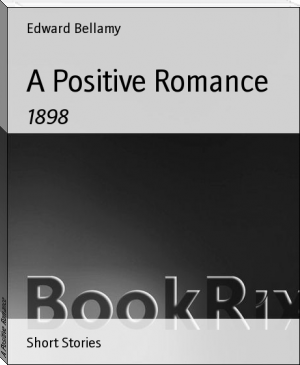A Positive Romance - Edward Bellamy (e manga reader .txt) 📗

- Author: Edward Bellamy
Book online «A Positive Romance - Edward Bellamy (e manga reader .txt) 📗». Author Edward Bellamy
My friend Hammond is a bachelor, and lives in chambers in New York. Whenever we meet on my occasional visits to the city, he insists on my spending the night with him. On one of these occasions we had been at the opera during the evening, and had witnessed an ovation to a beautiful and famous singer. We had been stirred by the enthusiasm of the audience, and on our walk home fell to discussing a theme suggested by the scene; namely, the tendency of man to assume a worshipful attitude towards woman, and the reason for it. Was it merely a phase of the passional relation between the sexes, or had it some deeper and more mysterious significance?
When I mentioned the former idea, Hammond demanded why this tendency was not reciprocal between the sexes. As a matter of fact, while women showed endless devotion and fondness for men, their feeling was without the strain of adoration. Particular men's qualities of mind or heart might excite the enthusiastic admiration of women, but such admiration was for cause, and in no way confounded with the worshipful reverence which it was man's instinct to extend to woman as woman, with secondary reference to her qualities as a particular person. No fact in the relations of men and women, he declared, was more striking than this contrast in their mutual attitudes. It was the feminine, not the masculine, ideal which supplied the inspiration of art and the aroma of literature, which was found enshrined in the customs and common speech of mankind. To this I replied that man, being the dominant sex, had imposed his worship on the race as a conquering nation, its gods on the conquered. He, not woman, had been the creator of the art, the literature, and the language which were dedicated to her. Had woman been the dominant sex, the reverse might have happened, and man been obliged to stand upon a pedestal and be worshiped.
Hammond laughed, but declared that I was all wrong. Man's tendency to worship woman, while naturally blending with his passional attraction towards her, did not spring from the instinct of sex, but from the instinct of race,--a far deeper and generally unrecognized impulse. Even though woman should become some day the dominant sex, man need suffer no apprehension of being worshiped. His modesty would be respected.
Some time later, when we had cozily established ourselves before a sea-coal fire in Hammond's quarters, with divers creature comforts at hand for one of our usual symposiums, the subject came up again; and under conditions so favorable to discursiveness our talk took a wide range.
"By the way," said I, apropos of some remark he had made, "talking about the adoration of woman, did not that crack-brained Frenchman, Auguste Comte, propose something of the sort as a feature of his 'Religion of Humanity'?"
Hammond nodded.
"I wonder," I said, "whether that feature of his scheme was ever actually practiced by his followers. I should like to get a chance to ask a Positivist about that, if indeed there are any in America."
Hammond smoked in silence for some time, and finally said, quietly, "Possibly I might tell you something about it myself."
"Hello!" I exclaimed. "How long since you have been a Positivist?"
"About twenty-five years," was the matter-of-fact reply.
"A Positivist of twenty-five years' standing," I ejaculated, "and never told of it! Why have you hid your light under a bushel all this while?"
"I said that it was twenty-five years since I had been a Positivist," replied Hammond; "as long, in fact, as it is since I have been a sophomore. Both experiences belonged to the same year of my college course, and, perhaps you may infer, to the same stage of intellectual development. For about six months at that time I was as ardent a convert, I fancy, as the Religion of Humanity ever had."
"I thought you had told me all about yourself long ago," I said. "How is it that you have kept so mum about this experience? I should fancy it must have been a decidedly odd one."
"It was a very odd one," replied Hammond,--"the strangest passage, on the whole, I think, in my life. I have never spoken of it, because it is one of those emotional experiences which no man likes to relate unless he is sure of being understood. To tell it to most men would be casting pearls before swine. I have always meant to tell you when a suitable opportunity came up."
"You know," he said, when I had signified my eagerness to hear, "that I graduated at Leroy College. It was a little one-horse institution, but blue as a whetstone in its orthodoxy; and with my father, who was a clergyman of a very strait sect and staid views, that fact covered a multitude of shortcomings. I was nineteen when I entered, and consequently twenty when, at the beginning of sophomore year, I came under the charge of Professor Regnier. He was a Frenchman, but spoke English with perfect ease and precision and a very slight accent. At the time I knew him, he was probably sixty. His hair was quite gray, but his mustache and imperial were still dark. It was rumored among the students that he had left his native land for political reasons, having played for too high stakes at the national game of revolution. True or not, the report naturally heightened the interest which his personality had for us.
"He made it his business to know personally all the students in his classes; and as it is not easy for a man of sixty, especially if he is also their teacher, to become really acquainted with students of twenty, the fact may be taken as evidence of his unusual tact. He was, I think, the most fascinating man I ever saw. His insight into character was like magic, his manners were charming, and his Gallic vivacity made him seem like a boy. Gradually, while still remaining to the rest of the students a genial and friendly instructor, he singled out a smaller circle of particular intimates. Of these I was one, and I believe the most trusted.
"Of course we boys were immensely flattered by the partiality of such a man; but equally of course the pursuit of his own pleasure could scarcely have been the motive which impelled him to seek our companionship. It was, in fact, a motive as unselfish as that of the missionary who leaves the comforts and refinements of civilization and exiles himself among savages that he may win them to his faith. He had been a personal friend and disciple of Auguste Comte, then but lately dead, and on coming to America had sought his present employment, not merely as a means of livelihood, but equally for the opportunity it offered for propagating the new gospel among young men. Do you know much about what Positivism is?"
I confessed that I knew next to nothing,--scarcely more than that there was such a thing.
"I shall not bore you with an account of it," resumed Hammond, "further than to say that it is a scheme for the perfection of the human race. It rejects as idle all theories of superhuman intelligences, and declares the supreme object of the individual love and devotion should be humanity. The rational demonstration of the truth of this system is sought in the course of history, which is claimed to prove Positivism the finality of social evolution. You will find anything else you want to know about it in the books. I dare say you will not be converted; but if you were nineteen instead of twice that, with Hippolyte Regnier to indoctrinate you, I fancy the result would be about what it was in my case.
"His personal influence over us, and the intoxicating flattery implied in being seriously reasoned with on themes so lofty by a man whom we so greatly admired, would have gone far, no doubt, to commend to us any form of opinions he might have taught; but there were not lacking other reasons to account for his success in converting us. As for Comte's dogmatic denial of superhuman existence, and his fanciful schemes of new society, we were too young and crude to realize how unphilosophic was the former, how impossible and undesirable was the latter. While accepting them as facts of a new creed, they meant little to us, nor did Regnier much insist upon them. What most he did insist on was the ethical side of Positivism,--the idea of the essential unity of the individual with the immortal race of man, and his obvious duty to forget self in its service. What could be better adapted to affect generous and impassioned boys than an appeal like this? The magnificent audacity of it, the assumption of man's essential nobleness, the contemptuous refusal to make any terms with selfishness, captivated our imaginations. I know now, indeed, that this enthusiasm of humanity, this passion of self-abnegation, which I thought a new religion, was the heart of the old religions. In its new-fangled disguise the truth and virtue of the doctrine were still operative, and the emotional crisis through which I passed I found was as essentially religious as it was in form unorthodox.
"At the end of sophomore year there were a half-dozen very positive young Positivists in our class. The pride of intellect which we felt in our new enlightenment was intoxicating. To be able to look down from a serene height, with compassion frequently tempered by contempt, upon the rest of the world still groping in the mists of childish superstition, was prodigiously to the taste of youths of eighteen and twenty. How, to be sure, we did turn up our noses at the homely teachings in the college chapel on Sundays! Well do I remember attending my father's church when at home on vacation, and endeavoring to assume the mental attitude of a curious traveler in a Buddhist temple. Together with the intellectual vanity which it fostered, our new faith was commended to us by its flavor of the secret, the hazardous, and the forbidden. We were delightfully conscious of being concerned in a species of conspiracy, which if it came to light would convulse the college and the community, have us expelled, and cause no end of scandal to the public.
"But the more I took my new faith in earnest and tried to make of it the religion it claimed to be, I was troubled by a lack that seemed to be inherent. Humanity, the object of our devotion, was but an abstraction, a rhetorical expression for a mass of individuals. To these individuals I might indeed render affection, service, compassion, tenderness, self-sacrifice; but their number and pettiness forbade me the glow of adoration with which service was touched in religions which offered a personified object of adoration. When, finally, I confided these troubles to Regnier, I expected to be rebuked; but on the contrary, and to my great discomfiture, he embraced me effusively after the Gallic manner. He said that he had been waiting for the time when in the course of my development I should become conscious of the need I had confessed before explaining to me the provision made for it by Positivism.
"To start with, he put in, as a sort of special plea for Positivism, that it was not singular among religions in recognizing as the object of devotion an abstraction, the mode of the existence of which was a mystery. As a solace to their votaries and





Comments (0)